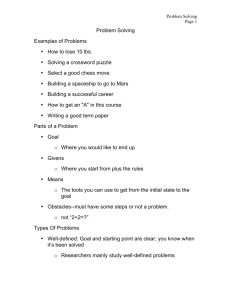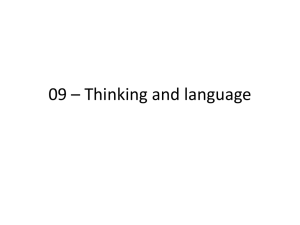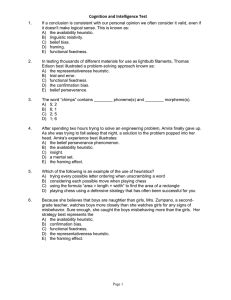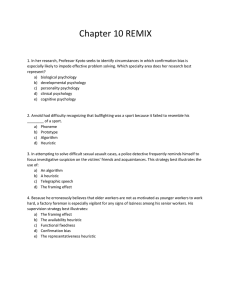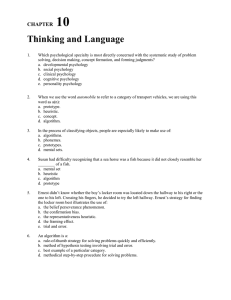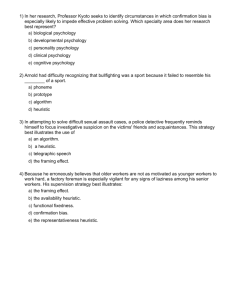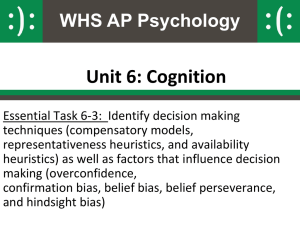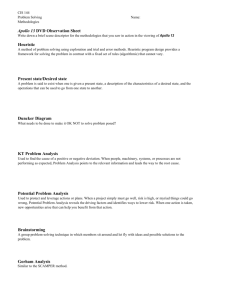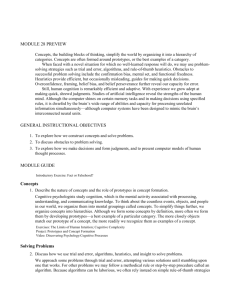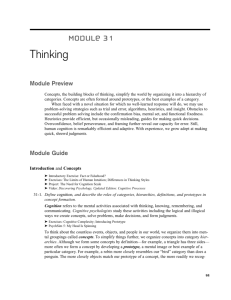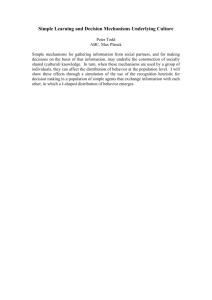Select the best answer for the following questions
advertisement
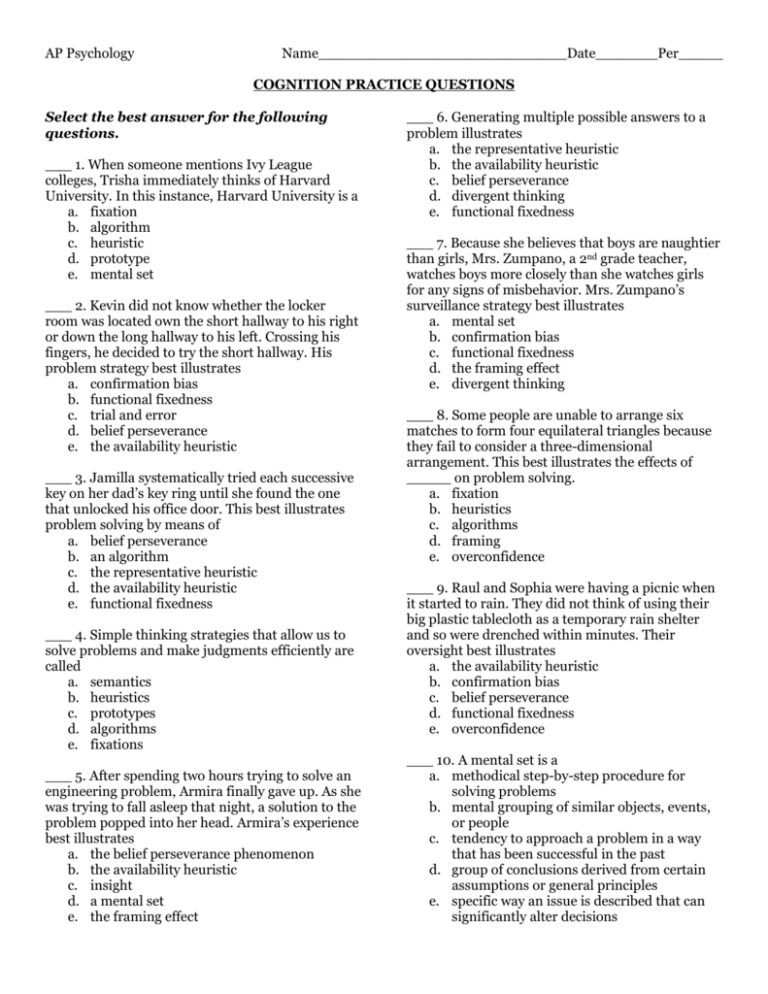
AP Psychology Name____________________________Date_______Per_____ COGNITION PRACTICE QUESTIONS Select the best answer for the following questions. ___ 1. When someone mentions Ivy League colleges, Trisha immediately thinks of Harvard University. In this instance, Harvard University is a a. fixation b. algorithm c. heuristic d. prototype e. mental set ___ 2. Kevin did not know whether the locker room was located own the short hallway to his right or down the long hallway to his left. Crossing his fingers, he decided to try the short hallway. His problem strategy best illustrates a. confirmation bias b. functional fixedness c. trial and error d. belief perseverance e. the availability heuristic ___ 3. Jamilla systematically tried each successive key on her dad’s key ring until she found the one that unlocked his office door. This best illustrates problem solving by means of a. belief perseverance b. an algorithm c. the representative heuristic d. the availability heuristic e. functional fixedness ___ 4. Simple thinking strategies that allow us to solve problems and make judgments efficiently are called a. semantics b. heuristics c. prototypes d. algorithms e. fixations ___ 5. After spending two hours trying to solve an engineering problem, Armira finally gave up. As she was trying to fall asleep that night, a solution to the problem popped into her head. Armira’s experience best illustrates a. the belief perseverance phenomenon b. the availability heuristic c. insight d. a mental set e. the framing effect ___ 6. Generating multiple possible answers to a problem illustrates a. the representative heuristic b. the availability heuristic c. belief perseverance d. divergent thinking e. functional fixedness ___ 7. Because she believes that boys are naughtier than girls, Mrs. Zumpano, a 2nd grade teacher, watches boys more closely than she watches girls for any signs of misbehavior. Mrs. Zumpano’s surveillance strategy best illustrates a. mental set b. confirmation bias c. functional fixedness d. the framing effect e. divergent thinking ___ 8. Some people are unable to arrange six matches to form four equilateral triangles because they fail to consider a three-dimensional arrangement. This best illustrates the effects of _____ on problem solving. a. fixation b. heuristics c. algorithms d. framing e. overconfidence ___ 9. Raul and Sophia were having a picnic when it started to rain. They did not think of using their big plastic tablecloth as a temporary rain shelter and so were drenched within minutes. Their oversight best illustrates a. the availability heuristic b. confirmation bias c. belief perseverance d. functional fixedness e. overconfidence ___ 10. A mental set is a a. methodical step-by-step procedure for solving problems b. mental grouping of similar objects, events, or people c. tendency to approach a problem in a way that has been successful in the past d. group of conclusions derived from certain assumptions or general principles e. specific way an issue is described that can significantly alter decisions AP Psychology Name____________________________Date_______Per_____ COGNITION PRACTICE QUESTIONS ___ 11. Which of the following best illustrates confirmation bias? a. Roger can’t find his 1-cup measuring cup and fails to realize he could use a tea cup b. Jeannette refuses to fly after seeing a news story about a recent plane crash c. Brett believes he is an outstanding driver, although most people are average d. A radio advertisement for a fast-food chain claims its hamburgers are made with 80% lean ground beef instead of saying 20 percent fat e. Asked to write an opinion paper on capital punishment, MacKenzie primarily searches for evidence that supports her opposition to the practice ___ 12. Miss Jan de Jong is orderly, neat, fairly quiet, and shy. She enjoys reading in her spare time and belongs to a social club that includes three librarians, nine real estate agents, and eight social workers. A tendency to conclude that Jan must be one of the three librarians would illustrate the powerful influence of a. confirmation bias b. the framing effect c. the representative heuristic d. the belief perseverance phenomenon e. the availability heuristic ___ 13. Many people feel they are more likely to die from homicide than diabetes because those instances stand out more in their memories. This demonstrates a. functional fixedness b. mental set c. the belief perseverance phenomenon d. the availability heuristic e. overconfidence ____ 14. Although Steve was certain that he answered between 70 and 80 items correctly on his biology test, he actually was right on only 55 items. Steve’s misjudgment of his test performance illustrates a. the representative heuristic b. confirmation bias c. the belief perseverance phenomenon d. the framing effect e. overconfidence ___ 15. Despite overwhelming and highly publicized evidence that Senator McEwan was not guilty of serious political corruption and misconduct, many who had supported her in past elections remained convinced of her political integrity. Their reaction best illustrates a. functional fixedness b. the representative heuristic c. belief perseverance d. the availability heuristic e. the framing effect ___ 16. If a stranger looks like someone who previously harmed or threatened us in some way, we may – without consciously recalling the earlier experience – react warily. This illustrates that our reactions to others may be influenced by a. critical periods b. algorithms c. intuition d. functional fixedness e. framing ___ 17. Ojinska sold many more raffle tickets when she told potential buyers they had a 10% chance of winning a prize than when she told them they had a 90% chance of not winning. This best demonstrates a. the representative heuristic b. divergent thinking c. confirmation bias d. the availability heuristic e. the framing effect ___ 18. Daniel was asked to write down as many words as he could think of that contained the letter “d”. To complete this task, Daniel would rely on a. divergent thinking b. framing c. convergent thinking d. belief perseverance e. the availability heuristic ___ 19. Many people perceive carjackings as more serious threats to their lives than failing to use seatbelts because carjackings are so much more memorable. This best illustrate the importance of a. belief perseverance b. the representative heuristic c. confirmation bias d. the availability heuristic e. functional fixedness
